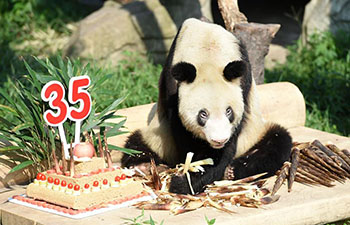SAN FRANCISCO, Sept. 16 (Xinhua) -- New research suggests fox squirrels organize their stashes of nuts by variety, quality and possibly even preference, by using "chunking," a cognitive strategy in which humans and other animals organize spatial, linguistic, numeric or other information into smaller more manageable collections.
Detailed in a paper published this week in the Royal Society Open Science journal, researchers at the University of California, Berkeley, noted that fox squirrels stockpile at least 3,000 to 10,000 nuts a year and, under certain conditions, separate each cache into quasi "subfolders" similar to those in a computer storage system, one for each type of nut.
The study used combinations of locations and nut sequences on various groups of fox squirrels.
In one experiment, each of the squirrels were fed 16 nuts, one after another, under two separate conditions: Some were fed at the locale where they had cached the previous nut fed to them while others were fed at one central location, to which they would need to return if they wanted another nut.
Some squirrels were given 16 nuts in rows of four, say, almonds followed by pecans, followed by hazelnuts and then walnuts, while others received 16 nuts in random order.
Using hand-held Global Positioning System, or GPS, navigators, the researchers tracked the squirrels from their starting location to their caching location, then mapped the distribution of nut types and caching locations to detect patterns.
The research team found that the squirrels who foraged at a single location frequently organized their caches by nut species, returning to, say, the almond area, if that was the type of nut they were gathering, and keeping each category of nut that they buried separate.
Meanwhile, the squirrels foraging in multiple locations deliberately avoided caching in areas where they had already buried nuts, rather than organizing nuts by type.
The findings over a two-year period from 45 male and female fox squirrels in wooded locations on the UC Berkeley campus suggest that when lacking the cognitive anchor of a central food source, the reddish gray, bushy-tailed rodents utilize a different and perhaps simpler problem-solving approach to avoid the areas where they had previously cached.
Presumably, according to the authors, sophisticated caching techniques maximize the squirrels' ability to remember where they've stored their most prized treats while at the same time hiding them from potential pilferers.
"This is the first demonstration of chunking in a scatter-hoarding animal, and also suggests that squirrels use flexible strategies to store food depending on how they acquire food," study lead author Mikel Delgado, a post-doctoral researcher who conducted the study along with UC Berkeley psychology professor Lucia Jacobs, said in a news release.



















